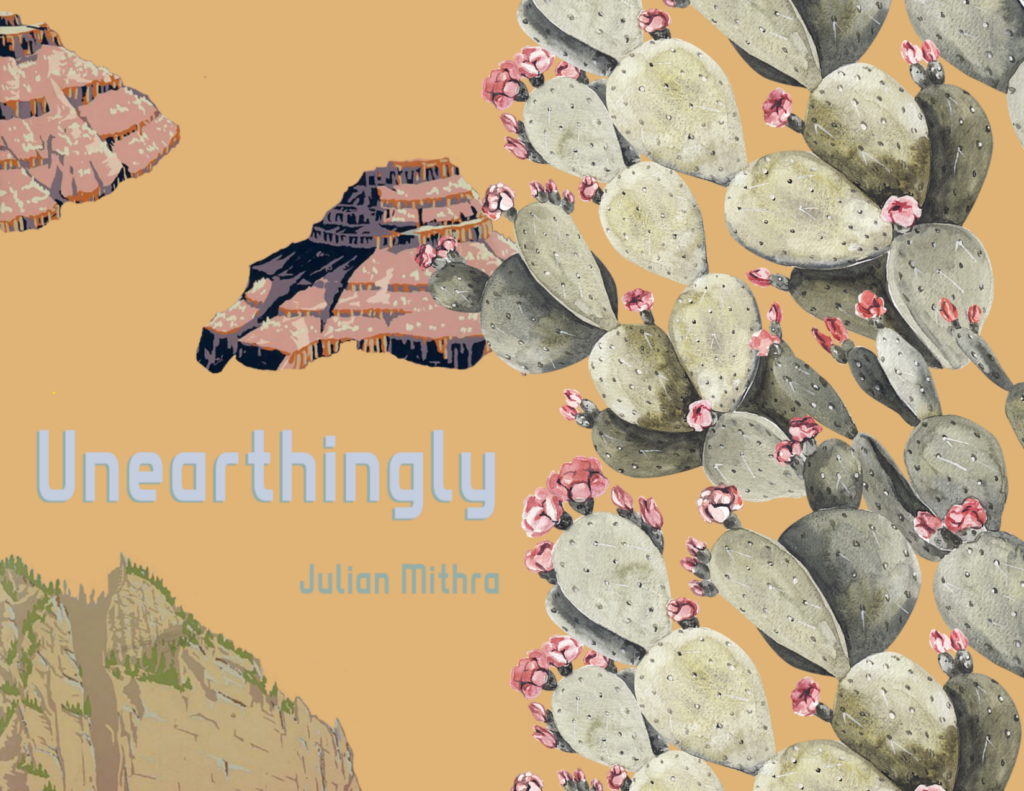Ways of Looking at a Ghost Town: On Julian Mithra’s Unearthingly

On a recent trip to Amarillo, my cell phone became confused. Google Maps thought I was somewhere I was not, and I (useless tech-lemming, following my iPhone off the edge of a cliff), followed its directions off the expressway, onto the backroads running in distant parallel to I-27. On these roads, the small, abandoned towns that had been shirked by the expressway for the last half-century become suddenly immediate. Half a dozen times in the hundred-and-twenty-odd miles from Amarillo to Lubbock, a smattering of houses would flash past, and then a defunct gas station, or a white-brick garage that looked as though it had been bombed-out, screen-doors ajar and plexi-glass windows teetering in their frames. Though these towns, or once-towns, were empty (mine was the only car in sight not half-swallowed by buffalo grass or leaning, cock-eyed on deflated tires) I still found myself slowing the car to a crawl when I passed by. Though they were empty, these spaces still seemed somehow crowded–not with people, of course, but with some potential for people, for community; or, conversely, the memory of people, of community.
There is much of this potential in the pages of Julian Mithra’s recent publication, Unearthingly. Mithra’s book, published by Kernpunkt Press, represents a sort of Western-States polyphony. Among these pages are a multitude of voices: textbooks and field notes, Depression-Era op-eds malignant with xenophobia and fear, children’s stories, and animal fables. Yet despite these dissimilar voices, the book goes to great lengths to preserve the reader’s assumption of a unifying consciousness. This consciousness belongs to Cheeky, an endearingly adventurous “Chicanx Tomboy” (from Kernpunkt’s website) who bears the weight of the book’s momentum, propelling the slim narrative forward as she descends into an abandoned mine.
Actually, “slim” is the wrong word; it implies an unintentionality on the part of the author that Mithra, excruciatingly intentional in every word that appears on the page, is far too careful for. The narrative is not slim, but is instead tenuous. A complete understanding of Goldened—the ghost town, or near ghost town, that the novel is set within— seems always just out of reach, leaving the reader in a constant state of near-revelation paralleled by Cheeky’s own. This is a result, of course, of the nature of Goldened: it’s a community in past-tense, and the task of knowing it is almost entirely archeological. It’s this archeology that Cheeky finds in the abandoned mines beneath the town, and what we receive on the pages of Mithra’s book. On pg. 31, Mithra invites the reader to look closer at that term, tracing the word back to the original Greek, “arche”:
For the ancient Greeks, arche encompasses their cosmology, the origin of the earth and sky and space between, as well as the pure form that each object inhabits, a form that is definitive and incorruptible, an essential principle.
Yet the lesson (if there is anything so simple as a lesson in this intricate, endlessly complex volume) of Unearthingly is that the notion of “arche,” of a Platonic absolute, is dubious at best. Instead, the novel proves again and again that form and phenomenon are subject to time and place, to power and position. Through the letters of Mr. Eveline Lovelace, Mithra demonstrates the ways in which the notion of “arche,” of an “essential principle,” can be channeled into xenophobic impulse. On pg. 63, Mr. Lovelace, writing in the Goldened Gazette, endorses “renationalization,” stating:
Like the grasshoppers invading our crops, we must join forces in battling the gobbling, seemingly limitless influx of foriegn workers following rumors of unskilled positions for the taking. Am I alone in reserving the perquisites and privileges attendant solely to those Americans struggling to make frayed ends meet?
Here, “arche” is not so much an essential truth as an essential falsehood; the myth that the white inhabitants of Goldened, separated from their colonist ancestors by only a handful of generations, must tell themselves in order to feel superior amidst the leveling devastation of the Great Depression. What becomes clear, however, is that Lovelace’s xenophobia comes to fruition; as Mithra tells us in the author’s notes, trains relaying American Citizens of Mexican descent did run from Colorado to the border in the first half of the twentieth century. This note invites us to consider a new element of “arche.” Perhaps, Mithra seems to be suggesting, it’s not so much the veracity of a notion that matters, but instead, the weight it comes to bear in the world. Each “arche,” which, to its bearer, is essential, represents a sieve through which the stuff of the world can be run, interrogated, and decided upon.
How true this is of the ghost towns of West Texas, so many of which seem to bear something of Mithra’s Goldened within themselves. The buildings of these towns—empty now for twenty-five years, or much more, by the looks of things—can be so easily brought to the status of paradigm by an itinerant observer, and made into a kaleidoscope through which the entire, empty town is turned and perceived. What I mean to say here, and what, I think, Mithra is saying more eloquently than I could ever hope, is that these empty places are empty only of flesh, but are rife with memory, meaning, and monument. Mithra’s book, then, acts as a guide through one such place, making careful use of a single consciousness—that of a young girl—to parse through detritus and debris in pursuit of an absolute. By the final pages of Mithra’s novel, pulling away from the ghost town of Goldened, CO, the reader is left to contend with a shaggy assortment of disparate absolutes, searching and asking, “but what is the essential thing?” Before long the main road appears and the ghost town is back in the far-distance, all silhouette and shadowy form–but the question remains.


